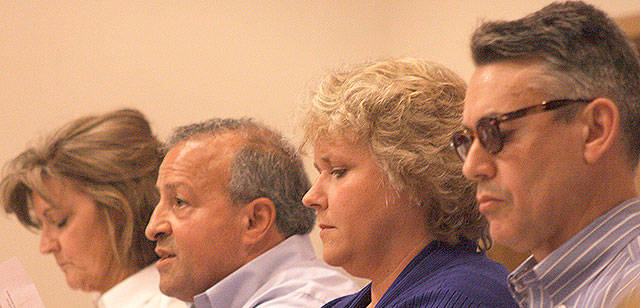The debate about how to spend city of Kent business and occupation tax revenue looms as one of the major differences among the four mayoral candidates.
Jim Berrios and Andrew Swansen made it clear on Wednesday at a Kent Chamber of Commerce candidates forum at the Meridian Valley Country Club that they support all of the revenue going to street repairs. Dana Ralph and Elizabeth Albertson each said the revenue spending shouldn’t be limited to just street projects.
“We were promised the money would be used for roads,” said Berrios, a chamber member when the city implemented the B&O tax in 2013. “It was to pay for critical street repairs and ensure a safe and efficient transportation system, not to pay down debt. This becomes an issue with credibility, and that’s why I’ve fought the battles (to only spend the money on streets).”
Ralph, a City Council member along with Berrios, wants some of the B&O tax money spent on other programs.
“When we established the B&O we dedicated $4.7 million to streets and we are collecting nearly double that,” Ralph said about the $9.3 million generated in 2016. “I believe that provides us with an opportunity without raising taxes to fund our parks and work on that ($60 million parks maintenance) backlog.”
Ralph proposed during the city budget vote in December to use B&O funds for parks, but the measure failed. The council agreed with Berrios’ proposal to use $2 million out of the city’s reserve fund for parks projects. Ralph opposed using the reserve funds for parks.
Swansen, a political newcomer, said the city needs to remain clear about how and where tax revenues are spent.
“I don’t share the frustration with my opponents of the B&O tax,” Swansen said about Ralph and Albertson. “But any tax we collect, it will go to what it was specified to go for. It won’t be cherry-picked for parks or any other programs that we want to put it towards.”
Albertson served on the council when it adopted the B&O tax.
“The compromise in 2012 was to make up for money we lost from the streamlined sales tax,” Albertson said. “(It was agreed) that some would go to roads and the rest to debt service, parks and other needed activities. Where the challenge is, whenever we silo money and say it must go to this item, it prevents the city from taking opportunities for grants such as if we got a large grant to fix our parks. But we had to come up with matching funds. We can’t take it out of the B&O because that’s going to roads.”
Voters will receive Aug. 1 primary ballots this week from King County Elections. The two candidates with the most votes advance to the Nov. 7 general election. The mayoral candidates participated in three forums leading up to the primary.
In the Wednesday forum, Berrios emphasized that city officials told the chamber B&O funds would be used for roads.
“I was in the meetings where a flyer came out: these roads are struggling and we need to repair them, and the trucks (on a street map) represent businesses,” said Berrios, who owns the Golden Steer restaurant on the East Hill. “As a business owner, we are not the enemy. We employ the citizens that live in Kent. I employ over 40.”
Albertson disagreed with Berrios about any agreement to spend B&O funds only on roads.
“Read the articles in the newspaper,” she said. “Go back and look at the votes and the meeting minutes. I have the letter from the chamber to support the compromise with some to transportation and the rest to fixing the city’s debt problem. Our Moody’s (credit) rating was in trouble. If we could not get that fixed, we could not function as a city.”
Albertson then ripped Berrios’ earlier comments about how his background in running a restaurant and previous job with the Denny’s restaurant chain helped him learn how to manage a budget.
“I have to disagree with Mr. Berrios because it sounds like he does not have a firm understanding about how a business work,” Albertson said. “Because if your credit is not good, it’s not OK.”
Swansen said concerns about how B&O money is spent wouldn’t be such an issue if the city managed its budget better.
“The crux of this is getting back to the budget and defining a correct budget and making Kent solvent so we have money to be able to spend on other projects,” he said.
Ralph pointed out parks can benefit businesses.
“We need to focus on having a whole city and part of that is parks,” she said. “Parks are good for business just as much as they are good for residents. It promotes a quality community, a quality of life for employees and can be used as an attraction and retention tool as opposed to being looked at just for the enjoyment of residents.”
Talk to us
Please share your story tips by emailing editor@kentreporter.com.
To share your opinion for publication, submit a letter through our website https://www.kentreporter.com/submit-letter/. Include your name, address and daytime phone number. (We’ll only publish your name and hometown.) Please keep letters to 300 words or less.

